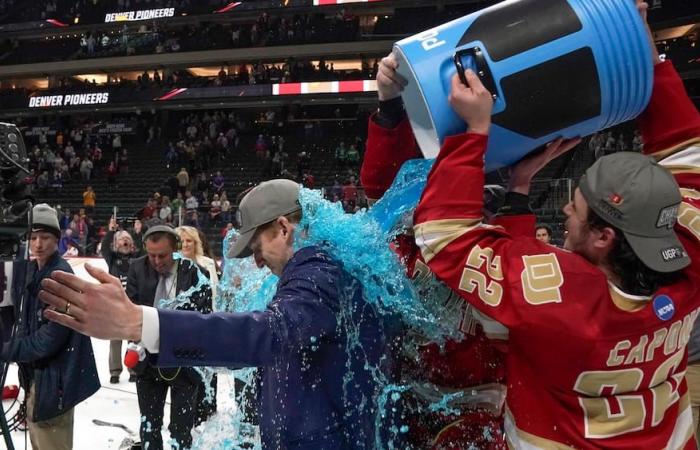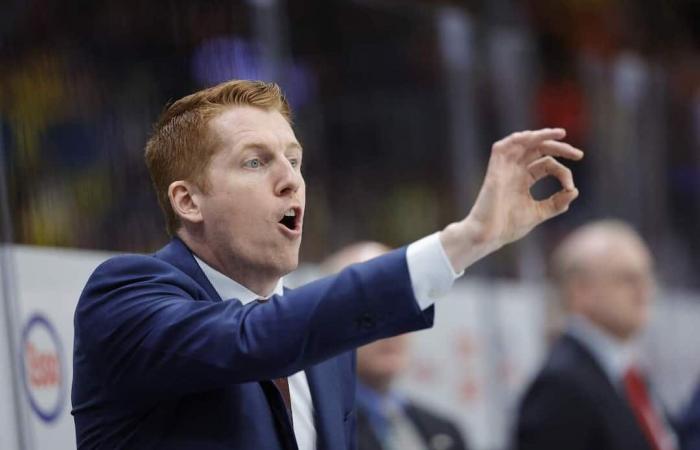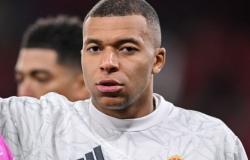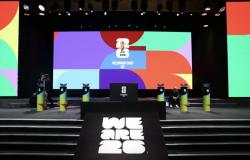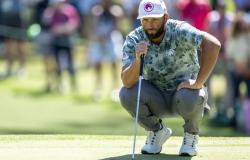As soon as a head coaching position becomes available in the National Hockey League (NHL), the name of David Carle emerges. At just 35 years old, Carle is the most promising hockey head in North America. His eventual hiring as head coach in the best league in the world is inevitable.
Right now, Carle is too busy winning at Denver, one of the most storied hockey programs in the NCAA. With the Pioneers, he compiled an incredible 161-64-16 record and won the national championship last year (against Jacob Fowler and Boston College in the final) as well as gold at the World Junior Championship behind the state bench -United.
How, at such an early age, did the redhead build such a solid reputation as a winner at such speed? Because life stole his hockey career from him.
A former defender, Carle, a product of the prestigious Shattuck St. Mary’s academy in Minnesota, was tipped to be drafted in the first or second round before the 2008 draft. Until the traditional “Combine”, a battery of tests medical tests reveal a serious heart condition: hypertrophic cardiomyopathy.
A condition so serious that it immediately ended his career. As the Montreal Heart Institute explains, the thickening of the heart muscle caused by the disease can cause a blockage to the outlet of the left ventricle of the heart. The risk can therefore be considerable during sustained physical effort.
The Tampa Bay Lightning still selected Carle in the seventh round, 203e in total, but the main person never played hockey again. How far would he have come if he could have reached the NHL? This question may have haunted him, but it no longer torments him.
“When I was younger, maybe, but these days I’m way too busy to think about that kind of thing,” he said live from the airport, during a telephone interview with the TVASports.ca.
Over time, regret eventually gave way to gratitude. Gratitude for doing the job he loves at a high level.
“I can say that I feel blessed and lucky with the way things have turned out for me. I love my workplace and am blessed to have benefited from the opportunities that have been given to me.
“Really, I couldn’t have asked for a better twist of fate when I look back on that frankly bad situation that happened in 2008.”
He’s right, basically. He could have been brooding, moping, living the rest of his life with this terrible feeling of injustice, this impression that the dice had been loaded against him. But here he is at the gates of the NHL, leading hockey’s young elite. He could hardly have succeeded better in this post-career, which was rushed to say the least.
What he learned from Lane Hutson
For a few weeks, Carle coached and watched young Montreal Canadiens defenseman Lane Hutson up close at the last World Junior Championship.
What does this brilliant hockey man learn from his brief experience with a player with an unusual style of play? Not necessarily his pirouettes.
“His level of competition,” Carle first mentions. It’s an underrated aspect of his game. It’s not the first thing that jumps out when talking about players of his stature. But he’s a really competitive player.
“When he jumps on the ice, he wants to make an impact. His hockey intelligence quotient and his skills belong to the elite.”
As Montreal fans have seen, Hutson plays like Hutson. There aren’t many players who move around the ice with the same gait.
“He is a bit different from the other players who are in the elite,” observes Carle. He looks different. He plays differently, he moves differently on the ends of his blades. He is unpredictable, he can manipulate the puck for a long time. I’m not surprised he’s having success.”
AFP
Remove a prodigy
The coach of the young Americans made a heartbreaking decision last year, that of removing prodigy James Hagens, expected to be chosen first overall in 2025.
“It made us think,” admits Carle. This is what we ask of our players, to complicate our decisions. We don’t want it to be easy.”
The second time could be the right one for this center player with very high potential.
“The experience he gained at our camp last December will give him more confidence this year,” predicts Carle, who will be aiming for a second consecutive gold medal.
The young instructor is excited about what Hagens could become in a few years, once he reaches full physical maturity.
“His head is always raised,” he points out. You start doing projections and you think, “Wow, what is he going to be able to do at 190 or 195 pounds, with toned legs?” You’re starting to get really excited. Because his hockey sense, you know it’s not going anywhere.
“No, what often happens is that once this maturity is reached, the skills and skating stand out even more. It’s normal that Hagens’ potential arouses so much enthusiasm.”
At a time when Hagens’ supremacy at the top of his vintage is being challenged by the likes of Michael Misa, Matthew Schaefer and Porter Martone, it’s worth remembering that the best is yet to come for Hagens.
It’s not us who’s telling you this, but one of the best hockey heads on the continent.

